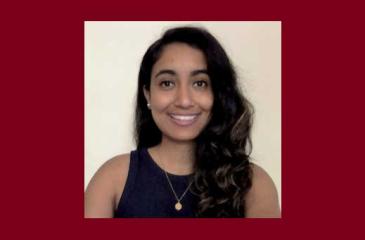Driven to be a Purposeful Scientist
Meet Sanju Koirala, a first-year graduate student in the Developmental Science program at the Institute of Child Development (ICD) and a member of both the DCAN Lab and the Elison Lab. A self-described first-generation, international, woman of color in science, she is passionate about making science more equitable and accessible to students from underrepresented backgrounds globally.
“I had never met a scientist or stepped in a research lab before coming to the U.S., and I feel extremely fortunate to have found the right mentors and opportunities at the right time throughout my career,” said Koirala. “However, if we really want to do science that includes and benefits all, we cannot rely on fortune to bring one brown girl at the table. So, I want to work towards actively adding more chairs and making sure that all chairs are equally sturdy.”
Koirala has formally and informally mentored multiple students at the U of M and internationally regarding their research interests and career. She co-founded the group Nepalese in Neuroscience to create a community of Nepali researchers to foster support and collaboration. She also organized career panels to advise students on application processes, co-created summer mentorship programs for international students during COVID, and presented “meet a scientist” with high school students in Nepal.
“I just try to be more visible and vulnerable about my success, failures, and lessons learned hoping it will help others find inspiration or support,” she said.
She is also engaged in disseminating scientific information. She co-organized and co-chaired a panel on mental health during Global Nepali Health Conference, and she gave several talks to Nepali communities regarding autism spectrum disorder and various other neurodevelopmental disorders, against the prevailing stigma associated with such conditions. “I hope to partner with families and organizations to create a resource and information hub for our minority communities to learn more about neurodevelopmental disorders and find the right clinic and support early,” she said.
Learn more about Sanju Koirala and her interest in developmental neuroscience:
What interests you in developmental neuroscience?
Growing up in a patriarchal Nepali society, I felt limited to who I could become. So I found an escape through stories, to an empowering alternate world that afforded me infinite possibilities. As I voraciously read books where characters are crafted over time, I became interested in understanding the developmental process of how we become who we are. This curiosity led me to the U.S. to study neuroscience at Hamilton College, followed by a research fellowship at Marcus Autism Center, Emory University, and these experiences further shaped my interest in developmental neuroscience; in understanding how our brain develops over time in health and disease.
What interests you in research at the U of M?
My research interest lies in understanding how our brain develops and how that trajectory goes different in various neurodevelopmental disorders and delays. DCAN lab is a hub of interdisciplinary researchers asking very interesting questions about the brain in health and disease and actively developing analytical tools to answer them. E-Lab provides me with a nuanced understanding of child development and how such trajectories can go differently over development. Being a graduate student at ICD and MIDB with the opportunity to work with Dr. Fair and Dr. Elison meant I could gain a very strong training in both cognitive neuroscience and developmental psychology to ask questions that bridge the fields.
What do you hope to learn through graduate school and your research experiences?
For short term goals, I hope to understand the theoretical frameworks, devise interesting questions, learn the advanced skillsets to answer my questions, and find ways to translate it to the broader community. For long-term, I want to be an amalgam of my formal and informal mentors both in and outside of lab to be a purposeful scientist, a supportive mentor, and a trustworthy leader in the field.
What has your experience been like so far?
Scientifically, it has been fascinating. I am in my second semester right now and the learning curve has been extremely steep. It’s a scientific wonderland and I am surprised by all the things I learn every day. It’s exciting.
Personally, graduate school feels intimidating at times especially when you are surrounded by hardworking geniuses all around and come from a background not traditionally represented in academia. However, my mentors, colleagues, and cohort mates have been extremely supportive and encouraging. And my imposter syndrome usually fades away in front of the privilege I feel to have the opportunity to learn and do what I absolutely love.
What are your career plans?
I want to be a developmental neuroscientist in academia and I want my scientific work to have translational impact in the society. Being at MIDB has been an amazing opportunity to see how a collaborative center with clinics, research labs, and efforts for community integration is formed. As an international student, I would love to be at a place and position where such efforts can be scaled globally.



